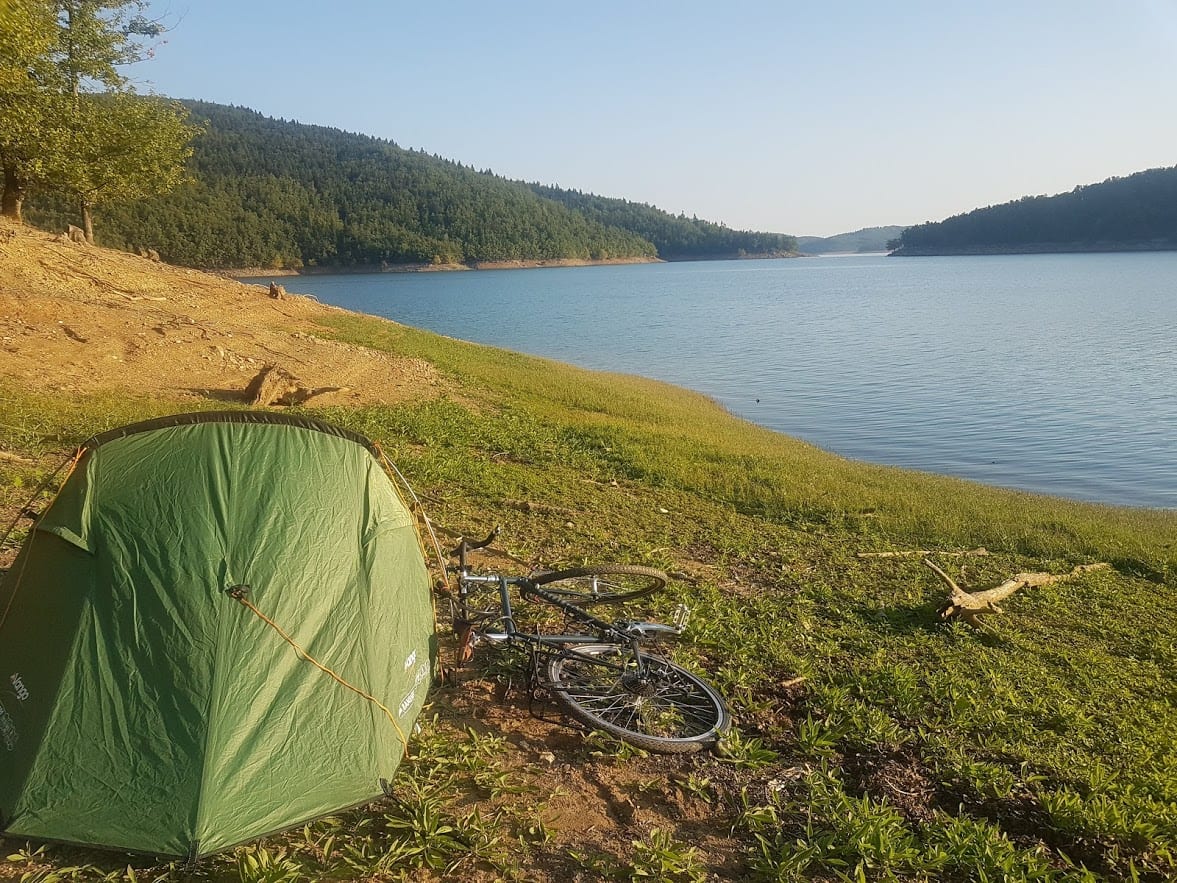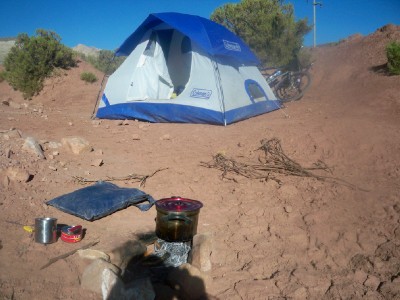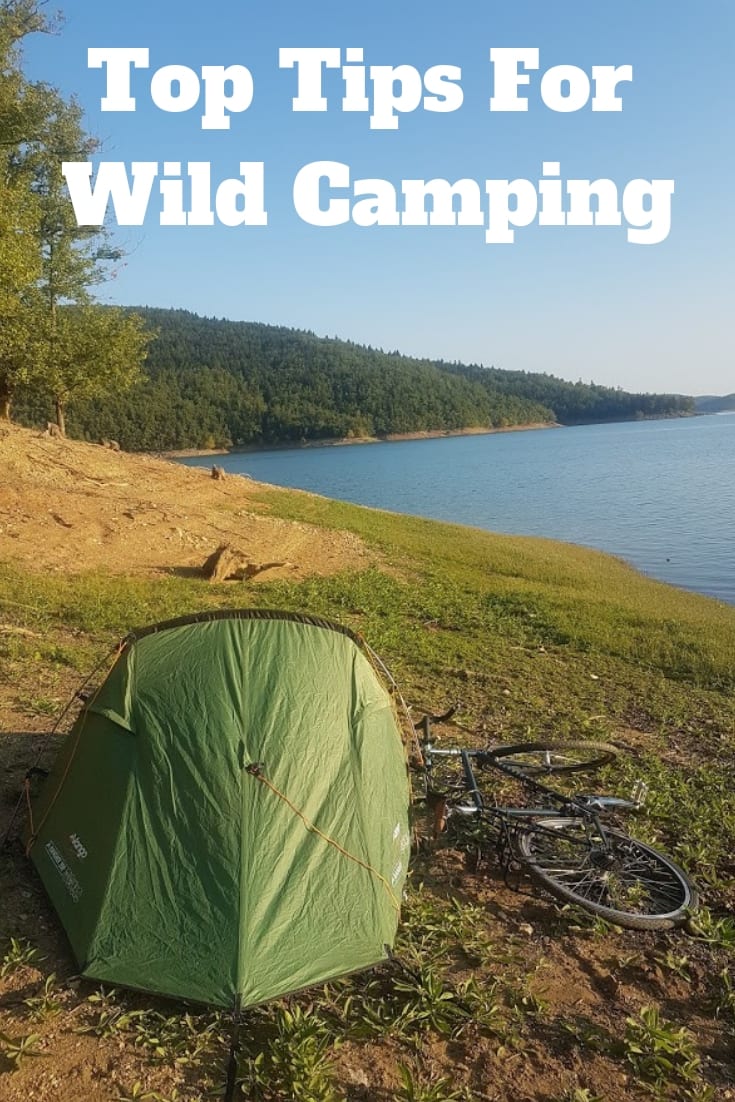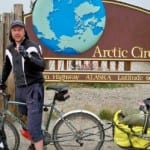Here's some good tips on how to stealth camp when bike touring, whether its your first night free camping or your hundredth!

Reasons To Stealth Camp When Cycle Touring
At one point or another, most touring cyclists will wild camp when on a long distance bike trip. Whether it is through choice, necessity, habit or desire, finding a place to camp for free is almost a rite of passage.
Stealth camping is also a great way to cut costs on a bicycle tour. Free camping opens up new possibilities and experiences, and goes towards making a bicycle tour the unique journey it is.
Tips for Wild Camping
For those that have stealth camped before, these tips on how to find camping spots for stealth camps may seem blatantly obvious. You might even have more tips to add.
Please feel free to contribute in the comments section if this is the case – Share the knowledge, share the love!!
For those that have never tried wild camping before, the following tips should prove to be very useful.
Related: Bicycle camping for beginners
What Is Bicycle Stealth Camping?
Stealth camping is the art of finding somewhere to use as a camp site to spend the night for free. Most people choose quiet, out of the way place for a stealth site such as fields or woods.
I have seen people wild camp everywhere though. On the side of the road, sports fields and even in the middle of town parks! This is a little bit too brazen for me. I prefer to keep the stealth in stealth camping, with an emphasis on not being seen.

Is Wild Camping legal?
Yes, no, maybe. It really depends on where you choose to camp and how you go about it. In addition, some countries have rules about where you can and can't camp. Nordic countries are well known for their liberal free camping rules – albeit with some caveats.
Personally, I generally prefer to wild camp where I won't be easily discovered, and so the question never arises. I tend to stay away from private land where possible. My favourite countries where I have stealth camped have been Peru, Bolivia, and Argentina. There's a lot of space in those countries and not many people!
I have been approached on rare occasions by local people, law or even army officials. A friendly conversation explaining that I am camping only for the night leaves everyone happy. Sometimes it leads to being invited somewhere else to camp which is even better.
My advice is to use common sense when it comes to where and how to wild camp, and you will be pretty much left alone.
Useful tips on How to Wild Camp
Ok, lets start with the tent. They come in all sorts of shapes, sizes and colours. Which one is best though?
A large, bright orange tent that takes a half hour to put up, is not going to offer any advantages to the wild camper!
A green coloured tent that is quickly put up and down in a few minutes is the best choice. One with a lower profile would be perfect.
The green colour will help it blend into the countryside during the night. The lower profile means that it won't stand out on the horizon. Avoid tents with reflective strips if possible, so that passing cars do not reveal it at night.
Note – You don't always need a tent to wild camp. I chose to use just the sleeping back on this warm night by a river. Other people use bivi bags, a camping hammock, or other methods.
Related: Choosing a tent for bike touring

Timing plays a factor when wild camping
Don't leave finding somewhere to stealth camp until the last minute. It is far better to start keeping an eye open for suitable spots an hour or two before it is due to start getting dark. Sometimes you will find a place straight away, sometimes it may take a little time.
There will be situations, especially in more heavily populated areas, where it may not be practical to find somewhere to camp until it is dark. Sometimes, you just have to push the bike off the road 50 metres, find some flat ground and hope!
A head torch may be of some use. In these types of areas, it is better to get up at first light, pack away, and get cycling again as quickly as possible.
Ask Someone Where To Wild Camp
Don't be afraid to ask the locals if there is somewhere suitable to camp for the night. A little knowledge goes a long way. You may even be invited to camp on someone's property or given a bed for the night.
Once you have found somewhere you think is suitable, take five or ten minutes to suss out the vibe of the place. Is it too close to a road, near cattle or on boggy ground?
I remember one irritating moment when I was setting my tent up, only to discover a family of bears watching me! I hit the road again pretty quickly!
After a bit of practice looking at where to camp when bike touring, you'll be able to pick out good spots in no time.
Don't Start A Fire
Unless you are in a wilderness area or it is common practice to have an open fire in the area you are cycling through, don't start a fire! It will give away where you are camping.
Many ‘dry' countries also suffer from wildfires. They are likely to take a dim view of your behaviour if you are discovered!
Stealth Camping Bike Touring – Keep it Quiet
The same goes for loud music. It will give away where you are camping, and may annoy people living nearby. It's best to keep all noise to a minimum.
Be Nice
In the unlikely event that someone asks you to move on, try explaining the situation calmly to them. A smile and a friendly attitude may soften them up, and enable you to get your head down for the night.
Whatever you do, don't start an argument and scream and shout This is going to achieve nothing, and may lead to problems. It's nice to be nice!

Is wild camping safe when bike touring?
Despite what you might think, gangs of armed robbers do not roam the countryside at night looking for wild camping cyclists to rob. This is not to say that it doesn't happen of course, but it is a rare event.
Careful selection of where to wild camp and being inconspicuous should be enough to keep safe. In some areas it may be wise to take other precautions.
If I think someone may have seen me set up camp for the night, I may tie my bike to my tent with fishing wire. This way I will be woken if someone tries to take it for example.
Don't wild camp in dry river beds
Avoid camping in dry river beds. It only takes a little bit of rain for water to build up and start flowing in them. Then, it could be goodbye tent, bike and gear!
Make sure you have enough water to make an evening meal and breakfast the following morning if needed. Taking a water filter when bike touring means you can always have clean, drinkable water.
A sponge bath might not go amiss either, especially after a sweaty day in the saddle!
Toilet Trips When Camping
By all means answer the call of nature, but do it away from your camp (and preferably not uphill from it!). It might not be pleasant, but do not leave any used toilet paper behind.
Important!!
The following morning, leave the area as you found it. Don't leave rubbish, empty cans or paper where you have camped. Take it with you.
Finally remember the Golden rule of Wild Camping – Pitch late, leave early, be as unobtrusive as possible, and don't leave litter behind!
You might also be interested in:
- Best Pillow for Camping When Bike Touring – Travel Pillows
- Essentials for Wild Camping
- Camping captions for Instagram
 Article Author- Dave Briggs
Article Author- Dave Briggs
Dave has cycled around much of the world, including multi-year bicycle touring trips such as Alaska to Argentina, and England to South Africa. Check out more of his reviews and tips about bike touring.
Follow Dave on social media for travel, adventure and bike touring inspiration: